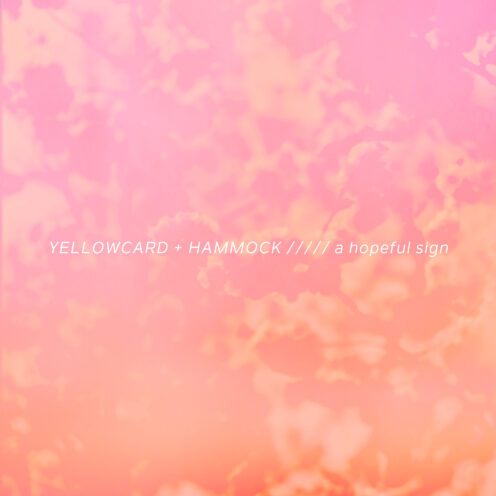
Remix albums can be a bit of a mixed bag. They exist sometimes to fulfill a contractual agreement between an artist and a label, to give new takes or perspectives on songs, or in the best case scenarios, to re-imagine songs in a way that makes it feel like you’re hearing the tracks for the first time all over again. Yellowcard have paired up with the ambient music duo of Marc Byrd and Andrew Thompson, better known as Hammock, to re-imagine some of their classic hits, as well as some noteworthy deep cuts, for a compilation affectionately titled A Hopeful Sign. Given the fact that Yellowcard’s latest EP, Childhood Eyes, featured several key collaborations, it makes perfect sense for them to continue down this path in their musical journey. Ryan Key shared, “Yellowcard is in a new place where we are collaborating with other artists more than ever before. I have found Hammock in my top three most played artists every year for nearly a decade now. Hammock are one of the defining and most pioneering artists in the post rock and ambient space. We have taken so much inspiration from their work over the years so first becoming friends, and then unexpectedly getting to work together on new music were dreams come true.” By taking a brave step forward in their partnership with Hammock, Yellowcard remain “top of mind” in these re-imagined tracks that breathe a new and fruitful life into some of their most beloved songs.
On the process for creating this re-imagining of Yellowcard songs on A Hopeful Sign, Key mentioned, ““For each of these songs, I just sent over a lead vocal and a piano and Hammock reinvented these songs in way that only they could do.” While this partnership may seem a little out of left field for the pop-punk band, anyone who checked out Key’s recent solo work would fully understand where this “fits.” The combination of Key’s solo work paired with the ultra-creative work of Hammock pays off greatly on this warm collection of nine revisited songs.
A Hopeful Sign opens up cautiously with a quieter version of “Empty Street” that finds Key using breathy vocals to paint the vivid picture of a dreamscape approach to the mix. The piano-based song here has slowed down the tempo from the original version, and Key makes each lyric count in his vocal delivery. One of my favorite Yellowcard songs of all time follows next in “Southern Air,” and the record begins to pick up some momentum with the partnership between the band and Hammock. By the middle section of the song, we get some drums introduced into the mix to provide a beating heart to the track. Whereas the original version of the song had a lengthy (and awesome) instrumental jam outro, the version found on A Hopeful Sign leans on brevity here.
The most recognizable song in Yellowcard’s discography, “Ocean Avenue,” is sequenced appropriately in the front section of the LP, and the piano-based track makes the lyric of “Let your waves crash down, and take me away” pulls in new meaning as the sound washes over the listener in the best way possible. “Telescope” was originally a mid-tempo ballad found on Southern Air, yet this version brings more contextual changes to the tempo and overall delivery. Key remains cautious in his vocal delivery early on, but as the song unfolds, he remarkably hits his intended targets over the ambient mix. Once the beat kicks in just under the 2-minute mark, you’re sure to be vibing with the music that Hammock/Yellowcard have put together.
The back half of the album opens with a dancey version of “You and Me and One Spotlight” that beautifully lofts to the heavens in its atmospheric construction. Key’s vocals remain top-notch and Hammock’s ability to find just the right note/feeling for each lyric cannot be understated. However, “Waiting Game” is the only song found on A Hopeful Sign that I found myself not being able to connect with as much, but the stylistic choices made here allow the track to feel purposeful in the overall sequencing. “Only One” brings clarity back to the LP with the smoky and brooding version of the song that breathes additional life into an Ocean Avenue classic. The guitar tones and overall delivery in the tail end of the track really need to be heard to be believed.
”A Place We Set Afire” fits well towards the end section of A Hopeful Sign that gives the audience more than a glimmer of hope that things will get better in their overall outlook. “Transmission Home” closes out the record by staying true to the sound that Hammock and Yellowcard paired up feels like throughout the album, and marks a fitting end to the ambient LP that is filled with so many breathtaking moments. While music can feel different in various settings, I’d recommend finding some good headphones and hitting play, in full, on this collection of songs that can wash away any bad vibes you started with and make you feel better about the world today. This re-imagined collection of songs ends up being a solid book-end to the latest chapter in Yellowcard’s discography, and yet it still feels like an essential release. That’s not an easy feat, and Yellowcard and Hammock should be commended for their work here.
 Empty Street
Empty Street